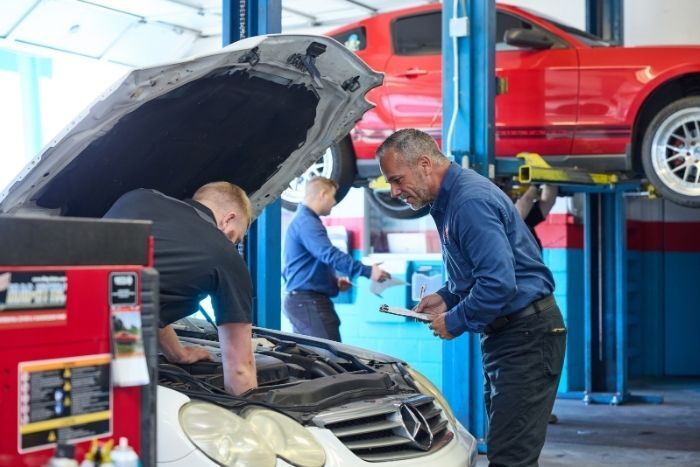24th Jun 2025
Why You Should Trust a Specialist for Auto Transmission Repair
You’re driving home, and suddenly the check engine light flares up. The car hesitates between gears, or maybe you catch a faint burning smell. You tell yourself it’s probably nothing but deep down, you know it’s time to deal with it.
Modern transmissions aren’t simple. They blend hydraulics, electronics, and mechanics into a single, high-pressure system. That means not just anyone should go poking around with guesses and basic scans.
This guide—written by Dusty’s Transmissions, where auto transmission repair is the daily language—explains what makes your transmission so complex, what warning signs to watch for, and why choosing a specialist matters more than ever.
Under the Hood: What Makes Transmissions So Complex
Your vehicle’s transmission is a lot more than just a gear shifter. It’s a full system of interconnected parts—clutch packs, valve bodies, torque converters, sensors, solenoids, and of course, transmission fluid. Every piece plays a role in keeping your car’s transmission shifting smoothly.
When even one element falters—like dirty fluid or a faulty solenoid—the whole transmission system can misfire. And because automatic, manual, and continuously variable transmissions all operate differently, pinpointing the issue requires deep knowledge and the right equipment.
That’s why transmission maintenance services shouldn’t be left to guesswork. Specialists in the transmission repair industry track these systems daily, using advanced diagnostic tools and staying current on updates across makes and models. It’s not just routine maintenance—it’s precision work that makes the difference between a quick fix and a costly rebuild later.
Red Flags That Demand a Specialist’s Attention
Not all transmission problems start loud. Sometimes it’s a hesitation when shifting into gear or a sudden jolt that doesn’t feel right. If your engine revs but the wheels don’t respond immediately, that’s a clear signal something’s off with your automatic transmission or manual transmission.
Other warning signs? Whining, buzzing, or grinding noises during shifts, especially when accelerating or climbing hills. And if you notice a burning smell or puddles under your vehicle, you could be dealing with leaking or contaminated transmission fluid. A transmission fluid change might help, but in many cases, the issue is deeper and could be a worn pan gasket, faulty seals, or pressure imbalances.
These symptoms don’t fix themselves. Relying on quick fluid top-offs or patch jobs might buy time, but they won’t solve the problem. A proper transmission inspection from a dedicated transmission shop helps diagnose the real issue before it turns into major repairs. That’s how you avoid wasted money and make sure your car stays safe and responsive.
The Specialist Advantage in Transmission Repairs
When it comes to transmission work, experience matters and so does focus. Transmission specialists dedicate their time to one system, meaning they’re trained to spot issues that other auto shop techs might miss.
They don’t just top off transmission fluid or scan for codes. They run full diagnostics: teardown inspections, dyno-testing, and targeted measurements that determine the real cause, whether it's a faulty solenoid or a worn-out pan gasket. Need a transmission fluid change or a full rebuild? They’ll know the difference and help you avoid extra costs.
With a tighter workflow, fewer misdiagnoses, and smarter appointment turnarounds, you’ll skip the trial-and-error. And with many offering a nationwide warranty, you walk away with a clean transmission fluid and a smooth ride. That’s the essential benefit of working with a team truly committed to transmission repair.
Added Benefits: Warranty, Cost Control, and Confidence
Transmission specialists bring more to the table than just deep knowledge—they also help protect your investment. Many offer warranties, whether built-in or extended, giving you backup if something doesn’t go right. That’s a big deal when you’re dealing with a system as central as your vehicle’s transmission.
Because specialists focus exclusively on transmission services, they’re better equipped to determine exactly what’s wrong—faster. No vague ballparking. You’ll know if you need a full automatic transmission fluid exchange, a new pan gasket, or simply fresh transmission fluid.
The right shop doesn’t just aim for a temporary fix. Their goal is to replace what’s worn, restore smooth operation, and deliver the best service—on the first go. That means fewer return visits, more cost control, and confidence every time you put the car in gear.
Bonus: Keep It Smooth with Easy Maintenance

Not every driver thinks about their transmission until something feels off, but a little effort goes a long way. Staying ahead of issues means checking your transmission fluid on a regular basis, watching for heat buildup, and easing into gear transitions instead of slamming into drive and reverse.
A specialist can walk you through a smart maintenance plan: full fluid flushes, filter changes, and inspections that align with your vehicle’s manufacturer specs. They’ll make sure your system runs clean, with new fluid that helps prevent internal wear and costly buildup.
It’s a simple process, but one that many customers overlook. A bit of knowledge plus the right shop can save you real money and extend your drivetrain’s life.
Smart Questions When You're Choosing a Specialist
Finding the right transmission shop means asking the right questions. Not every place works the same way and you want a team that knows your vehicle and respects your time and wallet.
Start with:
- “What’s your diagnosis process—scan only, or full teardown?”
- “Do you handle rebuilds in-house or outsource the job?”
- “What kind of warranty is included—and what does it really cover?”
- “If there’s an issue after the repair, how are customers supported?”
Answers to these give insight into how a shop operates on a regular basis, what kind of price transparency to expect, and how committed they are to keeping your driver experience smooth long after the new fluid goes in.
When Your Transmission Is Worth a Specialist
At Dusty’s Transmissions, we’ve built our business on getting the hard stuff right—from diagnostics to full in-house rebuilds. Since 1979, drivers across Southern Oregon have trusted us to handle their transmission needs with precision, honesty, and deep technical skill.
If your car’s acting off or if you’ve spotted any of the red flags, don’t wait. Send us a message to schedule your appointment. We’ll walk you through what’s going on and what it’ll take to fix it. You'll receive experienced work that keeps you running with confidence.
Conclusion
A transmission fix is protection for everything your car does next. Choose wisely, and your vehicle will thank you every mile forward.
Frequently Asked Questions
How often should I schedule a transmission fluid change for my vehicle?
Regular transmission maintenance helps extend the life of your system. Most vehicles benefit from a transmission fluid change every 30,000 to 60,000 miles, but check your owner's manual or ask a trusted technician for model-specific advice.
What’s the difference between a transmission fluid change and an automatic transmission fluid exchange?
A transmission fluid change typically drains and replaces only part of the fluid, while an automatic transmission fluid exchange replaces nearly all the old fluid for a more thorough service.
Can an auto shop diagnose transmission problems just by reading the check engine light?
While a check engine light can indicate transmission problems, pinpointing the exact issue requires deeper diagnostic tools and expert inspection, especially with automatic and manual transmissions.
Do transmission repair shops usually offer a nationwide warranty?
Reputable shops often back their work with a nationwide warranty, giving customers peace of mind that repairs are covered—even if you’re far from the original auto shop.



